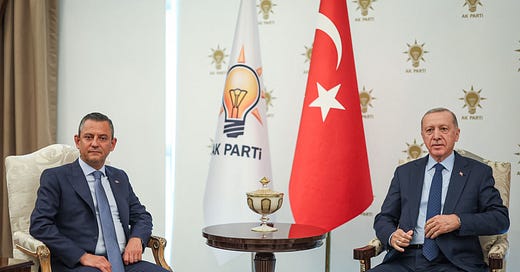ANKARA – Constitution talks have accelerated in Ankara following sweeping losses by the ruling Justice and Development Party (AKP) in the March 31 local elections.
With the topic at center stage, Turkish Parliament speaker Numan Kurtulmuş held discussions with political party groups and, for the first time in eight years, Pres. Recep Tayyip Erdoğan met with the chair of the Republican People’s Party (CHP) Özgür Özel.
Devlet Bahçeli, chair of the Nationalist Movement Party (MHP), also called for a new constitution to compensate for the dysfunctions of the presidential system during his first group meeting after the local elections.
However, no concrete initiative was taken on this subject until the last week of April. Before that, the AKP had held at least 11 roundtable discussions with high-level leaders and legal experts in recent years.
Throughout the latest round of talks, the ruling party conveyed a message that “politics has entered a period of softening” to make way for constitution amendments that require multi-party support to pass in parliament.
Turkey is currently governed by the 1982 constitution, which was drawn up after the military coup and has since been amended 19 times. AKP dignitaries and Erdoğan have long asserted their intentions to draw up a new constitution, rather than making further amendments to the current framework, which they define as “a patchwork”.
Following the post-election roundtables, presidential chief advisor Mehmet Uçum acknowledged that while a new constitution was the goal, the general consensus indicates one will not be “made from scratch”.
In a post on X, Uçum said the first three articles of the constitution, which cannot be modified, were 'irreplaceable' while highlighting the need to maintain the 50+1 rule for electing presidents.
Does Turkey need a new constitution?
“All attempts at constitutional change by the ruling party since 2007 pursue the interests of an individual and the party and have nothing to do with the objective of democratization,” said Murat Sevinç, a political scientist dismissed by decree law in February 2017 while he was teaching at the Faculty of Political Sciences of Ankara University.
In an interview with Turkey recap, Sevinç added that the nation “both needs and does not need” a new constitution.
"Most of the time, what is defined as a constitutional issue is actually a political issue, and the solution is not in the constitution,” he said. “It would be a great relief for the country if the ruling party abided by the constitution [in the first place].”
Işıl Kurnaz, a legal scholar known for her work on human rights, also stressed the need to first apply the current constitution before creating a new framework. Speaking to Turkey recap, she compared the periodic initiation of constitution debates to the transfer of a hospital patient to an emergency room when their vital signs are stable.
In his meeting with Erdoğan, Özel also cited shortcomings in applying the current constitution. BBC Türkçe reporting of the meeting based on AKP sources indicates Özel highlighted the cases of Gezi Trial detainees, the failure to implement European Court of Human Rights rulings and the failure to implement constitutional court decisions to release jailed Workers' Party of Turkey (TİP) deputy Can Atalay.
Reflecting on the meeting, Kurnaz said she believed Erdoğan was trying to create a constitution with cosmetic adjustments – like applying make-up – after his party’s defeat in the local elections.
“I don’t think the main motivations behind the cosmetic changes are to make a civilian constitution, nor are they fundamental rights and freedoms,” she said.
Kurnaz continued, “Each constitutional process advances with the references it contains. Has the AKP really presented a reference to the rights and fundamental freedoms, or on the contrary, has it presented a strategy by a president and a political power wishing not to be subjected to day-to-day arbitration? In my opinion, it is the second one.”
How did the latest debate start?
Unlike previous constitutional debates that were based on complete revisions, the latest discussion began in 2022 with an amendment proposal to protect headscarf rights in response to rhetoric from then-CHP chair Kemal Kılıçdaroğlu.
That year, a draft proposal was presented to parliament with the backing of 336 deputies in the ruling People's Alliance.
In addition to protecting headscarf rights, the draft also sought to protect families with text stating: "the primary duty of the state is to protect the family structure, which is the basis of Turkish society, and to take precautions against all kinds of dangers, threats, attacks, decadence and perversion against the family."
Women's and LGBTI+ non-governmental organizations took action against this proposal. Led by the Women's Human Rights Association, 23 different groups reviewed the draft and issued statements arguing:
“[The proposal] pits veiled women against LGBTI+ people, while calling LGBTI+ citizens ‘perverts’. It aims to bring hatred and polarization in society to the constitutional level by making a distinction between ‘veiled and unveiled’ women.”
The draft law was not voted on due to the Feb. 6, 2023 earthquakes in southern Turkey, and then it was further delayed by the 2023 general elections.
However, according to Ezel Buse Sönmezocak of the Women's Human Rights Association, the proposed amendments on headscarf and family rights may be included in a new constitutional proposal.
Speaking to Turkey recap, Sönmezocak said her association would fight against the constitutional amendment:
“The AKP had attempted to revise the constitution with two extremely discriminatory and hateful articles,” Sönmezocak said.
“The agenda of women and LGBTI+ people is not a new constitution but the implementation of already existing laws and also returning to the İstanbul Convention,” she added, referring to the Turkish government’s 2021 withdrawal from the international convention on combating violence against women.
This article was translated from Turkish by Mariam Haddad.
This newsletter is supported by readers via Substack and Patreon. Paid subscribers get full access to our recaps, reports, members-only Slack and news tracking tools. All proceeds go towards sustaining our journalism.
Turkey recap is produced by the Kolektif Medya Derneği, an İstanbul-based non-profit association founded by our editorial team to support and elevate news media and journalists in Turkey. Contact us: info@turkeyrecap.com
Diego Cupolo, Editor-in-chief @diegocupolo
Gonca Tokyol, Editor-at-large @goncatokyol
Ingrid Woudwijk, Managing editor @deingrid
Verda Uyar, Digital growth manager @verdauyar
Emily Johnson, Deputy editor @emilyjohnson
Damla Uğantaş, Deputy editor @damlaugantas
Onur Hasip, Economy reporter @onurhasip





